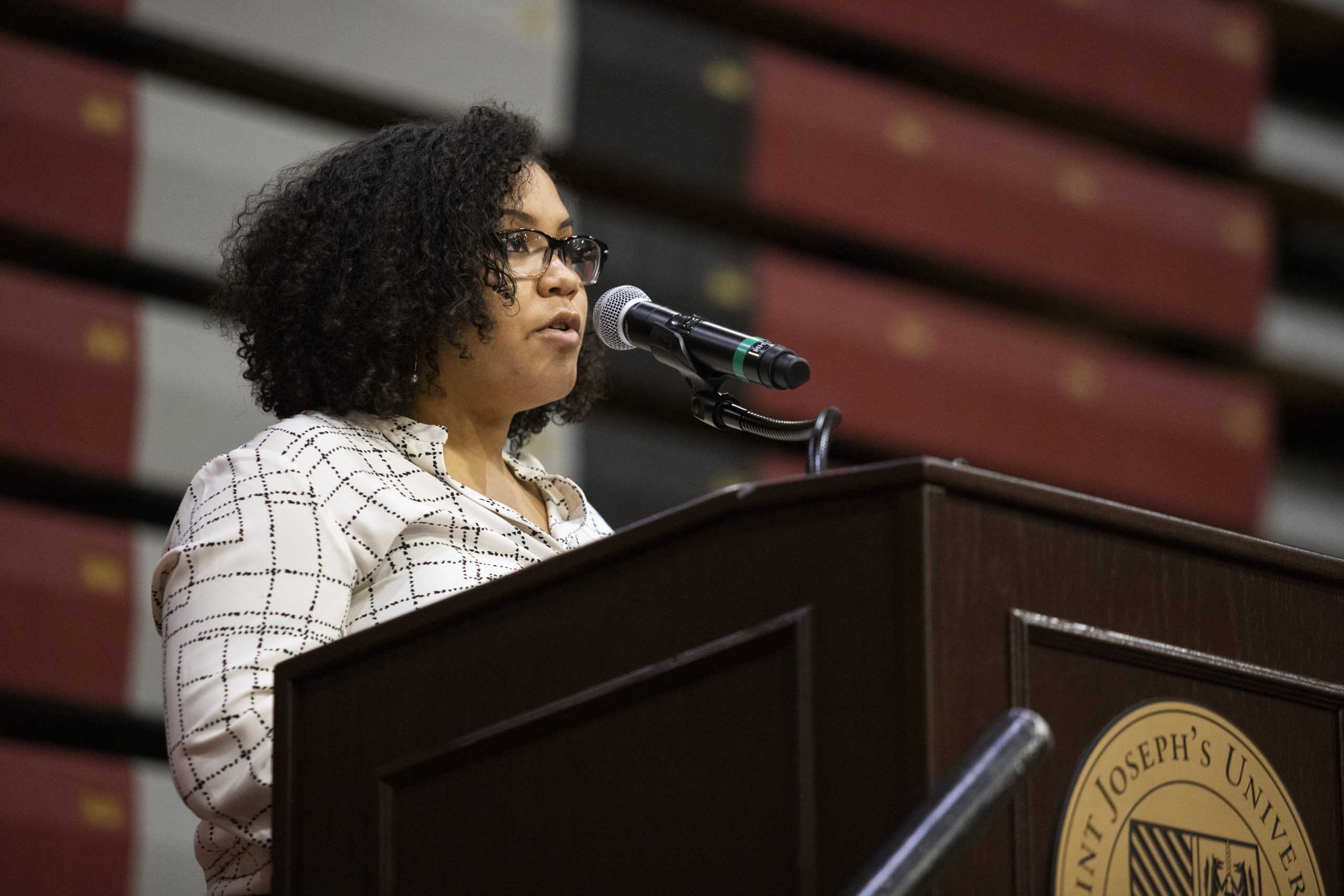Zoë Welsh ’22 approached the co-directors of the Dean’s Leadership Program (DLP) last semester with a challenge: to promote equity and inclusivity within the organization.
Vana Zervanos, Ph.D., associate dean of the Erivan K. Haub School of Business (HSB) and Ronald Dufresne, Ph.D., director of the Leadership, Ethics and Organizational Sustainability Program, serve as co-directors of the organization, which develops the leadership skills of members throughout their time at St. Joe’s following acceptance to the program as first-year students.
In response to Welsh’s charge, DLP will participate in and host a number of programs relating to diversity and inclusion this semester. According to Zerva- nos, upcoming programs include a workshop on inclusion and diversity with Janée Burkhalter, Ph.D., associate professor of marketing, an innovation lab session for women members and a possible program around civic engagement. Additionally, 15 student members attended an event entitled “Closing the Inequalities Gap to Achieve Social Justice” on Feb. 20 at the United Nations headquarters in New York.
The organization also created a new position, chair of inclusion and diversity, to which Welsh was appointed. Welsh said in her new position she is going to focus on issues of equity and inclusion as they pertain “to life, to student and global leaders, and how they relate to leadership and to the larger picture that is life.”
Brynn McCall ’21, a member of DLP, said it is important for future leaders to address diversity.
“You’re not just leading the people who agree with you,” McCall said. “You are leading the people who are different than you. What’s nice about the program including diversity is the fact that we’re learning about others and learning about how to communicate with people different from us.”
The organization accepted 41 first- year students for the 2019-2020 school year. In an effort to have a more representative cohort this year, DLP reached out to the Black Student Union and the Office of Inclusion and Diversity, said Zervanos.
“It is definitely a more diverse group than ever,” Zervanos said. “Having said that, it is clear we need to do more programming that focuses on diversity, [or] at the very least, invite conversation and dialogue around it.”
Welsh said her two main goals are to spread awareness about topics relating to equity and inclusion and encourage members to attend DLP workshops that start conversations around inclusion and diversity.
For the month of February, Welsh said DLP has encouraged members to attend Safe Zone Training, the Day of Dialogue on Feb. 20, a campus-wide event promoting conversation around equity and inclusion, and FACTUALITY, a board game that simulates structural inequality, on Feb. 27.
On a larger scale, Welsh said she wants to see DLP collaborating with other organizations, specifically University Student Senate and the Center for Inclusion and Diversity.
“It’s important for organizations to lead groups of people, especially those that might not look like you, [and] to create spaces that are accepting of all people,” Welsh said. “It’s hard to lead across differences. For leaders, it’s important to be flexible and knowledgeable.”
Joey Lam ’21, a member of DLP, said she has noticed a shift towards inclusion and diversity from DLP in their programming this semester. She said the newest class is more racially and ethnically diverse compared to when she was a first- year student.
“I think when I joined freshman year there were only a couple of members [who were] people of color,” Lam said. “I identify myself as a person of color. I’m not from the United States, so I was very surprised that I got into the program.”
Imani Briscoe ’17, program specialist for Inclusion and Diversity Experiential Programming, said she has worked in collaboration with DLP to expose their students to topics on inclusion and diversity and “help shape [students] into the leaders that our university needs.”
According to Lam, organizations like DLP are only one part of creating a more inclusive university environment. Addressing incidents of racial bias on campus and promoting inclusion are continuous efforts that need university-wide participation.
“If there’s a racial bias incident, [the university] immediately has a talk with the student body, and everyone on campus does a lot of things at the moment to kind of put out the fire and be like, ‘We addressed it,’” Lam said. “But once that dies down, [things] just slow down a little bit.”
For Welsh, too, there is always work to be done. She said there is a need to improve language, to learn more, to explore different theories and to become an accepting space for all students.
“DLP and the university, in general, have more work to do to push this movement toward holding ourselves accountable,” Welsh said.













































